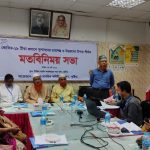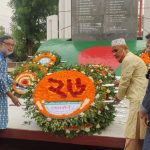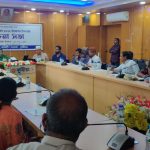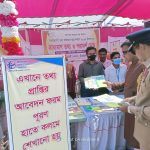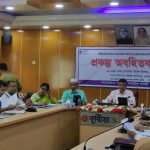 |
Transparency International Bangladesh (TIB) | ||
| 01 | Name and Address of the Organization | ||
|---|---|---|---|
| (a) | Name of Organization | : | Transparency International Bangladesh (TIB) |
| (b) | Address of Head Office | : | Transparency International Bangladesh (TIB) MIDAS Centre (Level 4 & 5), House-5, Road-16 (New) 27 (Old), Dhanmondi, Dhaka -1209 |
| (c) | Address of Liaison Office | : | Not Applicable |
| (d) | Address of District/Local Office | : | Committee of Concerned Citizens (CCC), Kushtia Transparency International Bangladesh (TIB) Holding No: 3/1 (old), 4 (new) Rc, Rc, Street, Court Para, Kushtia-7000 /td> |
| 02 | Contact Information | ||
| (a) | Name, Mobile No. & E-mail of ED/CEO | : | Dr. Iftekharuzzaman Executive Director Phone: (+880-2) 48113032, 48113033, 48113036, E-mail: edtib@ti-bangladesh.org |
| (b) | Name, Mobile No. & E-mail of Contact Person | : | Md. Raihanul Islam Area Coordinator Telephone: +8802477783754 Mobile No: +8801714092844 E-mail: raihanul@ti-bangladesh.org |
| (c) | Website | : | https://www.ti-bangladesh.org |
| 03 | Date of Establishment | : | 1996 |
| 04 | Registration (Legal Status) | ||
| (a) | Registration of Joint Stock Company & Firm | : | Not Applicable |
| (b) | Registration of NGO Affairs Bureau | : | NGO Affairs Bureau Registration No:1301 Date:21/10/2028 |
| (c) | MRA | : | Not Applicable |
| (d) | : | ||
| 05 | Background of Organization | : | Corruption is a key national challenge for Bangladesh. Corruption implies abuse of power for personal benefits. There is a close relationship between power and corruption, though not everyone in positions of power is involved in corruption. However, those who engage themselves in corruption, abuse their power political, economic or social, within or outside Government for personal gain. Corruption is also a behavior or act that breaks away or contradicts from ethical and moral standard, laws and civic virtues. Corruption involves giving and seeking of favors, buying political influence, taking kickbacks, and bribes. Corruption may also include any or a combination of such acts as embezzlement, fraud, nepotism, negligence of duty, misuse of public or institutional fund and extortion. Corruption is a menace that breeds and increases all forms of injustice, it accentuates poverty, prevents development, and undermines democracy and governance. It prevents rule of law, distorts market and stifles economic growth. Corruption creates and perpetuates social and economic deprivation and inequality. Corruption leads to violation of basic constitutional and human rights. It breeds crimes, social frustration and discontent. Corruption undermines the processes and structures that could be conducive to poverty reduction and promotion of human security. Corruption is nothing new, nor is it peculiar to any particular context. It takes place in greater or lesser degree in all countries of the world, irrespective of political and economic system, big or small, developed or developing. However, in a developing country like Bangladesh its impacts are most unbearable. Corruption has become a key issue of public interest in Bangladesh not merely because of the annual Corruption Perceptions Index (CPI) published by Transparency International which has for the fifth successive year ranked Bangladesh at the bottom of the list, but more importantly because of the way corruption affects the lives of the common people. Irrespective of whether Bangladesh ranks at the bottom or higher in international comparison, there is a widespread public concern in the country about a pervasive presence of corruption. All the major political parties recognize corruption as a key national issue and almost invariably identify fighting corruption as a top electoral commitment. Corruption must be fought comprehensively and strategically, combining both preventive and curative measures. Since the public sector is at the core of corruption and since corruption in the public sector is most unjustifiable and unbearable, it is incumbent upon the Government to lead the process. However, the people at large who are the ultimate source of power, have also a key role to play at both national and local levels to combat the menace by exerting pressure and demanding change, especially when the political will at the highest level is absent or not strong enough, and when the institutions of the national integrity system are not sufficiently effective. It is in this context that TIB sees itself as a catalyst of social movement against corruption, a comprehensive drive to promote effective citizens awareness and participation as well as collaboration and partnership with all stakeholders, including the Government. The main task is to contribute to the creation of an environment in which corruption will be hated and rejected by everyone and the anti-corruption movement will gain stronger grounds at all levels of the state and society. TIB's work is against corruption and its powerbase, not against the government, or any particular department or institution thereof, nor is it in TIB's mandate to investigate individual cases or allegations of corruption - big or small, local or national. TIB visualizes itself as a co-stakeholder and source of strength for all anti-corruption initiatives including the Government. |
| 06 | Vision | : | Transparency International Bangladesh (TIB) is an independent, non-government, non-partisan and non-profit organization with a vision of Bangladesh in which government, politics, business, civil society and the daily lives of the people shall be free from corruption. In the context of the international movement against corruption, as the fully accredited national chapter in Bangladesh of the Berlin-based Transparency International (TI), TIB partners and cooperates with TI and its chapters worldwide. |
| 07 | Mission | : | TIB's mission is to catalyze and strengthen a participatory social movement to promote and develop institutions, laws and practices for combating corruption in Bangladesh and establishing an efficient and transparent system of governance, politics and business. |
| 08 | Goal | : | Values: TIB is committed to values of democracy, justice, rule of law, transparency, accountability, integrity and impartiality. |
| 09 | Objectives | : | TIB started implementing Participatory Action Against Corruption – Towards Transparency and Accountability (PACTA) project on 1 January 2022 with the support from Foreign, Commonwealth & Development Office (FCDO), Swedish International Development Cooperation Agency (SIDA), and the Swiss Agency for Development and Cooperation (SDC). Building upon the integrity blocks that were formulated in the past to enable effective change, the new strategic phase focuses on active citizens’ participation in intervention areas. PACTA encompasses the core objectives of (a) identifying local governance challenges and engaging citizens’ groups for effective change, (b) reforming laws, policies, processes, practices, and accountability mechanisms in targeted institutions through research and advocacy, and (c) creating a feedback loop for monitoring, evaluating and re-visiting governance challenges by drawing on evidence generated from the big data platforms. To achieve these goals, TIB will continue to (1) generate knowledge through research, (2) advocate and communicate with stakeholders to catalyse effective change, and (3) implement the shift towards big data-based interventions by applying a social monitoring tool, which can provide tangible and quantifiable information on the impacts of TIB’s anti-corruption initiatives. |
| 10 | Target people | : | Community People |
| 11 | Major activities | : |
1. Stakeholder mapping 2. Project Orientation for CCCs and YES 3. Training on anti-corruption social movement for ACG members 4. Training for YES including Dhaka YES on the use of the App and online software 5. Project Inception Meeting with local level authorities 6. Community Mobilization (Citizens' gathering, campaign etc) 7. Campaign focusing day observance (IWD, WWD, WHD, Environment Day, Literacy Day, RtK Day, IACD and COP) 8. Information Fair 9. Engagement with CCCs 10. Engagement with YES 11. Coordination between ACG and YES member 12. Coordination meeting with CCCs and YES 13. Coordination between ACG and CCC member 14. Special initiatives by CCC 15. Special initiatives by YES 16. Use of PACTApp by trained ACG members 17. Community action meeting 18. Advocacy meeting with respective authority by ACG 19. Advocacy meeting with respective authority by CCC |
| 12 | Working Area (Name of Upazila & District) | : |
Kushtia Sadar Upazila, Mirpur Upazila, Kumarkhali Upazila and Kushtia District |
| 13 | List of Executive Committee | : |
Board of Trustees
Chairperson Professor Dr. Perween Hasan Vice Chancellor Central Women’s University Secretary General Mr. Ali Imam Majumder Former Cabinet Secretary Treasurer Mr. Mahfuz Anam Editor & Publisher The Daily Star Member Mr. Tawfique Nawaz Senior Advocate Bangladesh Supreme Court Member Mr. Abul Momen Writer and Journalist Member Ms. Parveen Mahmud FCA Managing Director Grameen Telecom Trust Member Professor Dr. Fakrul Alam Former faculty member Department of English University of Dhaka Member Professor Dr. Tasneem Arefa Siddiqui Founding Chair Refugee and Migratory Movements Research Unit (RMMRU) Member Advocate Susmita Chakma Lawyer and Human Rights Activist Committee of Concerned Citizens (CCC), Kushtia President Md. Rafiqul Alam (Tuku) Vice President Halima Khatun Md. Mizanur Rahman Lucky Member • Nazrul Islam • Dr. Sarwar Murshed • Asma Ansari Miru • Ashok Saha • Dr. Md. Abu Daud • Tariqul Haque Tarik • Jahurul Haque Chawdhury Ranju • Nilima Biswas • Mir Sanower Hossain • Tahmina Chawdhury Jharna • Shahjahan Ali • Farooque Haider Choudhury • Aktari Sultana • Khondakar Amanullah • Subhasis Saha • Md. Golam Mostofa • K.M.Tarik Ibne Amin • Md. Mujibur Rahman • Shahriar Hossain • Md. Rabiul Islam |
| 14 | Photo Gallery | : |
|
| 15 | Others | : | |

